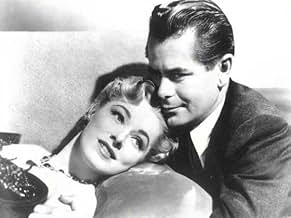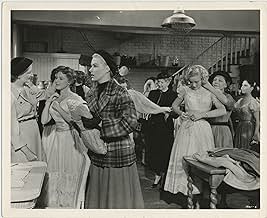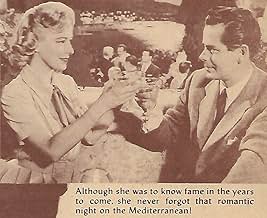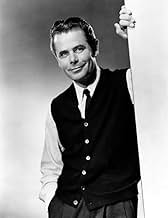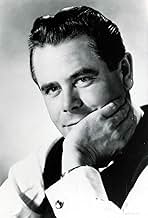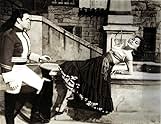CALIFICACIÓN DE IMDb
6.7/10
1.3 k
TU CALIFICACIÓN
Una cantante de ópera australiana alcanza la fama, lucha contra la polio y regresa a los escenarios.Una cantante de ópera australiana alcanza la fama, lucha contra la polio y regresa a los escenarios.Una cantante de ópera australiana alcanza la fama, lucha contra la polio y regresa a los escenarios.
- Dirección
- Guionistas
- Elenco
- Ganó 1 premio Óscar
- 1 premio ganado y 3 nominaciones en total
Phyllis Altivo
- Louise
- (sin créditos)
Benjie Bancroft
- Doctor
- (sin créditos)
Francis Barnes
- Singer
- (sin créditos)
Louise Bates
- Party Guest
- (sin créditos)
Mary Bayless
- Backstage Well-Wisher
- (sin créditos)
George Blagoi
- Audience Member
- (sin créditos)
Heinz Blankenburg
- Baritone
- (sin créditos)
Lulu Mae Bohrman
- Backstage Well-Wisher
- (sin créditos)
- Dirección
- Guionistas
- Todo el elenco y el equipo
- Producción, taquilla y más en IMDbPro
Opiniones destacadas
I was fortunate enough to be chosen as the stunt double for Eleanor Parker in this extraordinary film. I was in awe of her performance and cannot say how much I enjoyed working with her for several of her films. I thought the script was marvelous and did win an award I believe. Eleanor Parker is the true lady she portrayed in this once in a lifetime film. I never tire of seeing it - over and over again.
Eleanor Parker, a much underrated actress of the 1950s, probably hit the high point of her career when she essayed the role of Marjorie Lawrence in this biographical portrait.
Marjorie Lawrence was an Australian opera star whose career was cruelly interrupted by polio in the 1930s. The film follows Lawrence from her winning a singing contest in her native Winchelsea, Australia through her career with the Metropolitan Opera and her struggle with regaining her health. Lawrence is supported every step of the way by husband Dr. Thomas King,ably played by Glenn Ford. But it's Eleanor Parker's movie all the way.
Funny for a movie about an Australian, Parker doesn't even attempt an Australian accent. This is in the MGM tradition of Clark Gable who did not attempt any British accent in Mutiny on the Bounty. It worked just as well for Parker, though I'd be curious what a native Australian might think. Lawrence was the second female opera star who became a national treasure for Australia, the first being Nellie Melba. Parker shouldered a lot of tradition in this film and did it well.
The voice used by Parker for the operatic sequences is that of Eileen Farrell of the Metropolitan Opera. The sequences are well done, but the real drama in the scenes of Lawrence battling polio.
This film coincidentally enough came out at the same time that Dr. Jonas Salk discovered his vaccine preventive for polio. I still remember as a lad getting those polio shots at my public school. No movie studio could have planned that coincidence, but MGM reaped enormous profit because of it. As for Jonas Salk, no man of medicine has ever been admired in the same way in my lifetime.
Eleanor Parker was nominated for best actress, but lost that year to Anna Magnani in The Rose Tattoo. Look for a young Roger Moore in the role of Parker's brother and business manager.
My favorite scene in the whole film is Parker as Lawrence entertaining the troops overseas in World War II. Especially when she sings Waltzing Matilda to her native Australian diggers. It was like the whole beating heart of the Australian continent coming alive for an instant. Absolutely inspired.
This film gets the highest possible recommendation from me.
Marjorie Lawrence was an Australian opera star whose career was cruelly interrupted by polio in the 1930s. The film follows Lawrence from her winning a singing contest in her native Winchelsea, Australia through her career with the Metropolitan Opera and her struggle with regaining her health. Lawrence is supported every step of the way by husband Dr. Thomas King,ably played by Glenn Ford. But it's Eleanor Parker's movie all the way.
Funny for a movie about an Australian, Parker doesn't even attempt an Australian accent. This is in the MGM tradition of Clark Gable who did not attempt any British accent in Mutiny on the Bounty. It worked just as well for Parker, though I'd be curious what a native Australian might think. Lawrence was the second female opera star who became a national treasure for Australia, the first being Nellie Melba. Parker shouldered a lot of tradition in this film and did it well.
The voice used by Parker for the operatic sequences is that of Eileen Farrell of the Metropolitan Opera. The sequences are well done, but the real drama in the scenes of Lawrence battling polio.
This film coincidentally enough came out at the same time that Dr. Jonas Salk discovered his vaccine preventive for polio. I still remember as a lad getting those polio shots at my public school. No movie studio could have planned that coincidence, but MGM reaped enormous profit because of it. As for Jonas Salk, no man of medicine has ever been admired in the same way in my lifetime.
Eleanor Parker was nominated for best actress, but lost that year to Anna Magnani in The Rose Tattoo. Look for a young Roger Moore in the role of Parker's brother and business manager.
My favorite scene in the whole film is Parker as Lawrence entertaining the troops overseas in World War II. Especially when she sings Waltzing Matilda to her native Australian diggers. It was like the whole beating heart of the Australian continent coming alive for an instant. Absolutely inspired.
This film gets the highest possible recommendation from me.
MGM fashioned a sumptuous, full-scale production in bringing the career of Australian opera diva Marjorie Lawrence to the screen. Heading the cast as Lawrence is the fine Eleanor Parker, in one of her most impressive roles. Co-starring as her supportive doctor-husband is the talented Glenn Ford. Both are most convincing in relaying the inspirational "real life" story of their struggle with physical- career- and marital-obstacles.
Whether Lawrence did in fact sing roles which included lyric soprano, dramatic soprano, mezzo and Wagnerian, as depicted here, is open to question. Still, it is lovely to see these excerpts staged so beautifully, and in gorgeous Technicolor. Of invaluable assistance is the magnificent voice of Eileen Farrell in a remarkably varied repertoire.
It may not be possible to experience the real impact of these scenes unless there is a special house revival with a full-sized Cinemascope screen and stereo sound. The formats of VHS and even DVD to not do justice to the original production.
Although Lawrence assisted on the script, the actual unfoldment has the ring of fact merging with fiction for maximum dramatic impact. Now that Lawrence's 30's and 40's career is but a memory in the minds of a few, what remains is this romanticized version of history. As such, lovers of romantic drama and of music may revel in a tale of ardor and challenge, with the artistic product being the "fusion of the arts": grand opera.
Whether Lawrence did in fact sing roles which included lyric soprano, dramatic soprano, mezzo and Wagnerian, as depicted here, is open to question. Still, it is lovely to see these excerpts staged so beautifully, and in gorgeous Technicolor. Of invaluable assistance is the magnificent voice of Eileen Farrell in a remarkably varied repertoire.
It may not be possible to experience the real impact of these scenes unless there is a special house revival with a full-sized Cinemascope screen and stereo sound. The formats of VHS and even DVD to not do justice to the original production.
Although Lawrence assisted on the script, the actual unfoldment has the ring of fact merging with fiction for maximum dramatic impact. Now that Lawrence's 30's and 40's career is but a memory in the minds of a few, what remains is this romanticized version of history. As such, lovers of romantic drama and of music may revel in a tale of ardor and challenge, with the artistic product being the "fusion of the arts": grand opera.
Eleanor Parker is one of my favorite actresses from the '40s and '50s and does a marvelous job here, lip-synching to perfection various Wagnerian opera arias (as well as Puccini and Verdi). The storyline is somewhat similar to that of Jane Froman's career in that both were singers who, although paralyzed, continued with their singing careers and entertained servicemen as well. Glenn Ford lends solid support as the understanding, long-suffering husband who is always there when she needs his moral support. Roger Moore has a small role as her brother.
Everything moves smoothly under Curtis Bernhardt's direction. The opera segments are beautifully staged and filmed (in gorgeous technicolor, of course). Parker demonstrates her acting skills to the fullest and Eileen Farrell does a superb job on the vocal dubbing.
Well worth your time--inspirational and enjoyable even if you're not an opera lover. Filmed in wide screen technique, it loses something on video showings.
Everything moves smoothly under Curtis Bernhardt's direction. The opera segments are beautifully staged and filmed (in gorgeous technicolor, of course). Parker demonstrates her acting skills to the fullest and Eileen Farrell does a superb job on the vocal dubbing.
Well worth your time--inspirational and enjoyable even if you're not an opera lover. Filmed in wide screen technique, it loses something on video showings.
The film does a fine job with the crippling illness of Lawrence and her comeback onstage, but most notable are the performances by the stars. Glenn Ford and Eleanor Parker were never better. Just superb. The scene where she tried to commit suicide and Ford stopped her, broke down, and asked God for help is magnificent and a must-see. Ford and Parker should be well-remembered as excellent actors.
¿Sabías que…?
- TriviaEleanor Parker can read music, and has perfect pitch as a singer. She decided to study the scores of the opera songs used in this movie on her own. She rented a cabin in Lake Arrowhead, California, and played the records while singing along, until she had the breathing and phrasing memorized. Then when filming the scenes, instead of lip-synching to the tracks recorded by Eileen Farrell for the movie, she sang full voice (but an octave lower). She is proud of the fact that they never had to do a re-take, in order to "match" the tapes. She nailed it on the first take every time.
- ErroresAfter Marjorie sings "Annie Laurie" and she wheels herself into the kitchen and she suggests a concert tour, right as she and Dr. King are embracing .
- Citas
Marjorie Lawrence: [drinking champagne] Tonight I love the whole world and I want them to know it.
Dr. Thomas King: And tomorrow you'll have a monumental hangover.
Marjorie Lawrence: That's the advantage of going out with doctors.
- ConexionesFeatured in 1955 Motion Picture Theatre Celebration (1955)
- Bandas sonorasDon Carlos
(1867) (uncredited)
Music by Giuseppe Verdi
Libretto by François Joseph Méry and Camille du Locle
Aria "O don fatale" Performed by Eleanor Parker (dubbed by Eileen Farrell) with piano accompaniment
Selecciones populares
Inicia sesión para calificar y agrega a la lista de videos para obtener recomendaciones personalizadas
- How long is Interrupted Melody?Con tecnología de Alexa
Detalles
Taquilla
- Presupuesto
- USD 2,367,000 (estimado)
- Tiempo de ejecución1 hora 46 minutos
- Relación de aspecto
- 2.55 : 1
Contribuir a esta página
Sugiere una edición o agrega el contenido que falta

Principales brechas de datos
By what name was La melodía interrumpida (1955) officially released in India in English?
Responda


